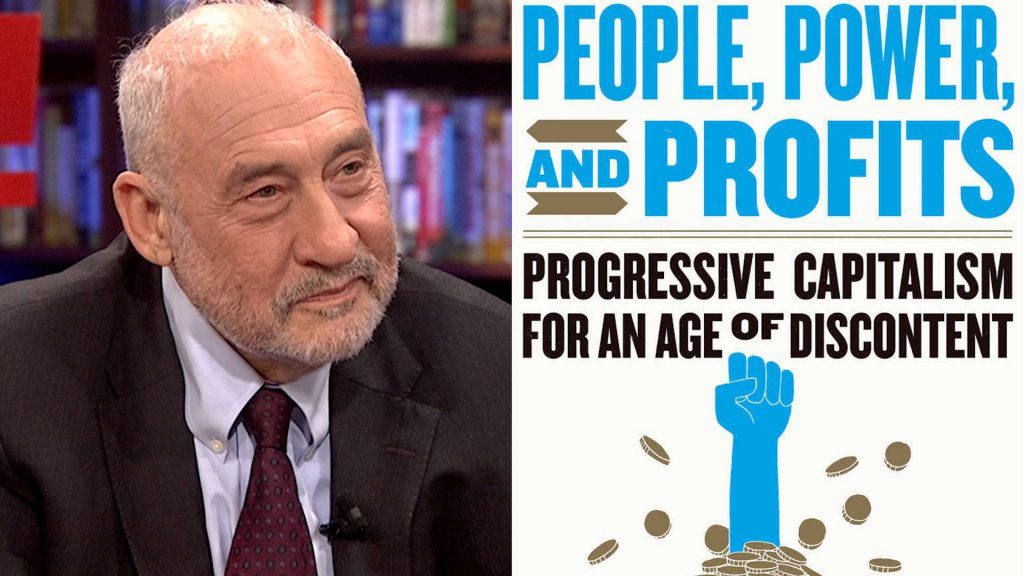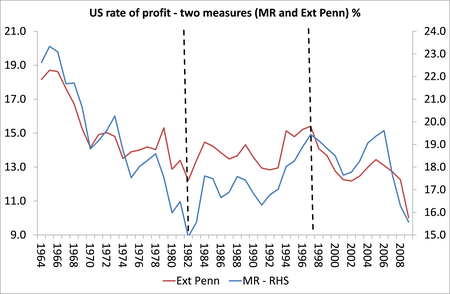Why should capitalism be “Saved from itself”?
Michael Roberts is an Economist in the City of London and prolific blogger
Cross-posted from Michael Roberts Blog

Joseph Stiglitz is a Nobel (Riksbank) prize winner in economics and former chief economist at the World Bank, as well as an adviser to the leftist Labour leadership in the UK. He stands to the left in the spectrum of mainstream economics.
He has just published a new book called People, Power, and Profits: Progressive Capitalism for an Age of Discontent, in which he proclaims that “We can save our broken economic system from itself.” He is very concerned about the rising inequality of incomes and wealth in the major economies, especially in the US. “Some 90 percent have seen their incomes stagnate or decline in the past 30 years. This is not surprising, given that the United States has the highest level of inequality among the advanced countries and one of the lowest levels of opportunity — with the fortunes of young Americans more dependent on the income and education of their parents than elsewhere.”
You see, capitalism used to be ‘progressive’ in that it developed the economy and raised the human condition, using scientific knowledge and innovation; and it worked well, with the rule of law and democratic checks on ‘excesses’. But then in the 1980s, Ronald Reagan and Margaret Thatcher came along and changed the rules, deregulating the economy – and now Trump is breaking down the checks and balances. So the progressive capitalism of the 1960s has been destroyed. By relying on uncontrolled markets, exploitation and inequality has run riot.
“The result is an economy with more exploitation — whether it’s abusive practices in the financial sector or the technology sector using our own data to take advantage of us at the cost of our privacy. The weakening of antitrust enforcement, and the failure of regulation to keep up with changes in our economy and the innovations in creating and leveraging market power, meant that markets became more concentrated and less competitive.” (Stiglitz)
What is Stiglitz’s solution? “Things don’t have to be that way. There is an alternative: progressive capitalism. Progressive capitalism is not an oxymoron; we can indeed channel the power of the market to serve society.” You see, it is not capitalism that is the problem but vested interests, especially among monopolists and bankers. The answer is to return to the days of managed capitalism that Stiglitz believes existed in the golden age of the 1950s and 1960s.
How are we to return to the golden age of progressive capitalism? On Democracy Now, the online broadcaster, Stiglitz was asked in an interview: “should it be progressive capitalism or workers power?” He replied, “the market is going to have to play an important role. So, that’s why I wanted to use the word “capitalism.” But I wanted to signal that the form of capitalism that we’ve seen over the last 40 years has not been working for most people. And that’s why I talk about people. We have to have progressive capitalism. We have to tame capitalism and redirect capitalism so it serves our society. You know, people are not supposed to serve the economy; the economy is supposed to serve our people”. When he was asked “Hasn’t capitalism always done that (ie serve the rich and the monopolies rather than the poor and workers)?”, he responded “Not to the extent that it has.”
Stiglitz’s views are either pure naivety or clever sophistry –or maybe both. Does he really think that there was a period when capitalism benefited both workers and corporations; rich and poor? The ‘golden age’ after 1945 up the late 1960s was the exception in advanced capitalist economies and then only for those economies, not for Latin America, Asia, the Middle East and Africa. For the greater part of the globe, those decades were ones of dire poverty and a battle against imperialist exploitation.
Anyway, it is a myth that in the 1950s and 1960s that everybody gained from ‘progressive’ capitalism in the West. And what gains that were made in public services, a welfare state, relatively full employment and rising incomes were mainly the result of struggle and pressure by the labour movement, forcing concessions from the owners of capital.
And Stiglitz never explains why this supposed regulated, democratic progressive capitalism came to an end in the 1970s, except to suggest it was down to the vile politics of Reagan, Thatcher etc. But readers of this blog know that there was a change of objective conditions from the mid-1960s, namely a sharp fall in the profitability of capital globally.
That meant that capital could no longer accede to rising real incomes, more public services and free education and health etc. The years of high profitability that allowed for concessions were over. Profitability is the driving force of capitalism, so politicians were elected (both right and left) committed reducing the welfare state and labour power; privatising and deregulating. Above all, progressive” capitalism had a series of major slumps that weakened the labour movement and restored (to some extent) profitability.
Indeed, Stiglitz never mentions the causes of recessions at all except to suggest that they are due to rising inequality: “If we had curbed exploitation in all of its forms and encouraged wealth creation, we would have had a more dynamic economy with less inequality. We might have curbed the opioid crisis and avoided the 2008 financial crisis.” And yet the international slumps of 1974-5 and 1980-82 took place when inequality was at its lowest since industrial capitalism began (according to Thomas Piketty – graph). So rising inequality was not the cause of the Great Recession but the result of efforts to raise profitability after the 1980s.
And how do we get back to this ‘progressive capitalism’ anyway? Stiglitz proposes regulation, breaking up the ‘monopolies’, progressive taxation, ending corruption and enforcing the rule of law in trade. “The prescription follows from the diagnosis: It begins by recognizing the vital role that the state plays in making markets serve society. We need regulations that ensure strong competition without abusive exploitation, realigning the relationship between corporations and the workers they employ and the customers they are supposed to serve. We must be as resolute in combating market power as the corporate sector is in increasing it.” These prescriptions are the stock of the reformist left in the US and elsewhere. America’s Left Democrat Senator Elizabeth Warren has made similar proposals with her “accountable capitalism” plan.
What on earth would make the top 1% and the very rich owners of capital agree to reduce their gains in order to get a more equal and successful economy? And how would regulation and more equality deal with the impending disaster that is global warming as capitalism accumulates rapaciously without any regard for the planet’s resources and viability? Programmes of redistribution do little for this. And if an economy is made more equal, would it stop future slumps under capitalism or future Great Recessions? More equal economies in the past did not avoid these slumps.
Unlike 1949, in 2019, none of Stiglitz’s ‘progressive’ measures are possible. Indeed, radical change is now probably only possible with ‘workers’ power’ and if that became a reality we could move beyond such measures to real democratic control of the economy, by replacing capitalism, rather than ‘saving it from itself’’.




Be the first to comment